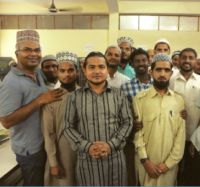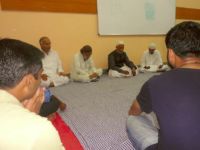
To our surprise and joy, we found there were around 50 students waiting for us in the Hall. It is important to say who these students are.
They are post graduate students who have completed Alim/Fasil courses. They are doing a two year course on dawa, the mission. One could liken them to the students of licentiate in Missiology. Ghulam bhai introduced us to his students. He words were precious, he said: “these Christian friends are brothers of Muslims and they are keen bridge-builders between Christians and Muslims”. Pointing toward me he said: He is a Christian alim and he represents Catholic Christians to us”.
I was asked to say a few words. I touched briefly upon history to highlight the present approach of the Catholic Church towards Muslims that is found in the documents of the Vatican Council II. I said that in the past both Christians and Muslims emphasised the truth of one’s own religion by refuting the other: false religion of corrupted Scriptures – the Muslim verdict on Christianity; and false mysteries of false prophet – the Christian verdict on Islam.
I gave the example of Christian-Muslim interactions took place in the Court of Mughal Emperor Akbar (1556-1606). He invited the Jesuits to his Court. The Jesuits arrived at his court in 1580. Emperor Akbar intended to discuss with them matters concerning religion and philosophy. The Jesuits, however, hoped to convert the emperor to Christian faith by arguing convincingly in the public debates that were organized with the Muslim religious men in Akbar’s Court. The Jesuits in those public debates provoked the Muslims to state their objections against Christianity. Then they answered all the objections that Muslims raised against Christianity through intellectual arguments. Moreover, the Jesuits also tried to expose the falsity of Islam and the sinfulness of Muhammad from the Muslim writings.
The Jesuits in the Mughal court engaged Muslims the way in which Catholics took on Protestants in Europe in their times. In the imagination of the Jesuits, Muslims occupied the place of Protestants in India. The Jesuits organized all their efforts to correct Muslims so that they would see the truth that the Jesuits presented. In these controversies, they failed to realize that their attempts would not bear fruit since they do not give Islam the place it deserves as a religion.
These Jesuits did not remind themselves of what Thomas Aquinas exhorted the missionaries. He stressed that Christians should not to attempt to prove the Christian Mysteries to non-Christian people. He stated that Muslims do not have a common ground with Christians with regard to the Christian mysteries of Faith. These mysteries though are not against Reason but above it. Discussion on a rational level only clarifies objections. Faith was a gift, not a truth to be proved. One should bear witness or teach, not prove or argue.
The Jesuits’ approach ended in failure. They expected that Muslims would come to faith at the end of a successful argument. Though the Muslims were rendered speechless at their debate with the Jesuits, they did not get converted to the Christians faith. Emperor Akbar wanted to hear some positive presentation of Christian faith but he got mostly the negative presentation of Islam. Unfortunately, these debates did not give enough space for Christian witness. In the following 17th and 18th centuries noting substantial happened in the area of Christian-Muslim relations in India. We shall go into the following 19th and 20th centuries In the 19th and 20th Centuries several Protestant missionaries organised public debates on ‘’The True Revelation’’ with Muslim scholars. They also distributed pamphlets and Bible tracts to people who attended such debates. Three important figures who worked in India; Henry Martyn, William Muir and Karl Gottlieb Pfander need to be mentioned here and I will highlight certain difference between their approaches.
Henry Martyn (1781 – 1812) prepared several tracts for public debate with Muslims on the question of ‘’True Revelation’’. However, he realized that such public events did not give an opportunity to share Christian faith with Muslims but only widen the distance between Christians and Muslims and end up in fruitless spiritual deafness. He looked for small circles of Muslims who were interested in listening to his personal sharing of his Christian faith. He found such small circles allowed him to share the peace that he attained in Christ with others. He also realised that in order to share the Christian experience of forgiveness and peace with Muslims he also need to appreciate what he found good among Muslims and their faith. He ascribed that goodness he found in and among Muslims to the activity of God. Moreover, he insisted that Christians in relation with Muslims need to give direct attention to the Qur’an and the Bible. He also maintained that good friendships need to be fostered between Christians and Muslims in order to listen to the spiritual sharing of one another.
Henry Martyn brought a new perspective to Christian Muslim Relations. His main motive was to share the gift of faith: the forgiveness and peace he attained in Christ with Muslim friends. There is a Copernican revolution in his approach. Firstly, he did not intend to win over Muslims through intellectual arguments but sought to share the personal experience of living in Christ with Muslim friends. Secondly, he appreciated what he found good among the faith of his Muslim friends. This attitude of openness was completely absent in the approach of Jesuits in the Mughal Court. It is also interesting to note that he attributed the goodness he found in Muslim faith to the activity of God. He has charted a new course in the Christian-Muslim relationship when he recognized the presence of God in the faith of Muslims. This openness he showed towards Muslims also led him to study the Qur’an. He also advised those who are in interested in approaching Muslims that they should give attention to the Sacred Scriptures of these two religions: the Qur’an and the Bible. He recognized that God works in the hearts of men and women through their scriptures. His attitude points to the importance of listening to the prompting of the God’s Spirit in the Scripture of the others in interfaith relations.
However, William Muir (1819 – 1905) and Karl Gottlieb Pfander (1803 – 1865) who came after Henry Martyn did not appear to follow his model. Muir focused mainly on the authenticity of the Bible in his writings. Muir wanted to show the Qur’an borne testimony to the Bible. His attempt is not something new as in earlier history we find some authors like Peter the Venerable and Paul of Antioch argue in this particular way. Muir also wrote a study on the life of Muhammad and the history of Islam in which he concluded that the Qur’an was only a historical document about Muhammad’s inner evolution. Pfander, in his work: The Balance of Truth, argued that Islam’s claim to be a true revelation cannot be substantiated. Their approach aroused the anger of Muslims and these controversies did not contribute fruitfully to Christian-Muslim interaction.
In Our Times, The Second Vatican Council brought a sea of changes into Christian-Muslim relations. The first explicit reference to Muslims in the council documents occurred in Lumen Gentium (1964). In paragraph 16 this document said: ‘’the plan of salvation also includes those who acknowledge the Creator, among whom are, in the first place, the Muslims. These profess to hold the faith of Abraham, and together with us they adore the one, merciful God, judge of humankind on the Last Day.’’ In the following year the Council in its Nostra Aetate (third paragraph) dealt exclusively with Muslims. The statement on the Muslims began with an uncompromising phrase that changed the Christian attitude towards Muslims profoundly. The statement said that the Catholic Church has high regard for Muslims and went on to explain the reason for the esteem in which Christians should hold Muslims. The Councilar attitude had its impact on Christian-Muslim relations in India. I told my listeners we stand before them as Christian brothers shaped by the spirit of the Vatican Council II. I spoke in Hindustani.
Then the floor was opened for greater interaction between Christian participants and Muslim students. A Muslim student asked: What impressed you in Islam? Alex, a first year theology student of Vidyajyoti responded saying the aspect of prayer in Islam impressed him. He further added that ‘taqwa’ the ‘God awareness’ that Muslims experience through ‘namaz’, ‘dua’ and ‘zikr-Allah’ is that something inspires him and challenges him to grow in his own spiritual and religious life.
Certainly, Alex as a Catholic Christian recognizes profundity of Muslim worship. Christian friends of Muslims are impressed by the sincerity and devotion of Muslim worship and appreciate that the essence of Islamic worship is submission to God. Muslim attitude to worship indeed challenges Christians to become more disciplined in their own worship and prayer. In deep friendship with Christians, Muslims can recognize that a Christian is seeking a personal encounter with God and a personal fellowship relationship with the one whom is worshiped in sincerity. Thus right attitude makes one’s worship sincere. In sincere friendship both Muslims and Christians come to recognize their common commitment to God in specific ways.
A Christian student asked the madrasa friends: What is the most precious teaching of the Qur’an according to you? One of the Muslim students who responded said: “love”. It is an interesting response, I felt. Often I have heard from many Muslim friends saying the Law or the Will of Allah that is expressed in the Qur’an. At this point I should say that I learnt a precious lesson of dialogue. Listen to the heart of a Muslim. What he says is important, need to be pondered. I certainly recognize Muslims who meditate the 99 names of Allah color themselves with the color of Allah, as Sufis say. Though, God is love is not one of the 99 names of Allah, deep experience of remembering God (zikr-Allah) using the Holy Names of God as given in the Qur’an helps a Muslim to recognize as God is love. It is within the paradigm of Qur’anic revelation as every chapter of the Qur’an begins (except one) with “in the name of God, the Lord of Mecy, the Giver of Mercy”. The Quranic word ‘rahman’, it is said that God being mighty and majestic is merciful. The other Quranic word ‘rahim’ in its intensive form suggests that the quality of giving mercy is inherent to God’s nature.
Our conversation turned towards ‘common ground’ between Christians and Muslims. Both Christians and Muslim believe in one God: one and the only God. They recognize this One God, albeit in different ways. Christians believe that the one God reveals God’s nature as Love in Jesus, the messiah. That the One God who is love invites all men and women to a covenantal relationship with God’s self in and through Jesus. Christians call upon this One God as heavenly Father. Muslims believe deeply the God is absolute and transcendent and God is not incarnated in history. In the Islamic belief God who is merciful and compassionate indeed revealed God’s will and guidance for humanity, not God’s interior life or God’s nature. The present write deeply appreciate that both Christian and Muslim theology students clearly express their belief without any ambiguity in an atmosphere of mutual understanding and friendliness. Such sharing indeed helps one another to understand and respect the religious convictions of the other.
The conversation then turned towards terrorism. It was emphasised that Islam does not promote hatred for others. Ghulam further explained that certain sections of Muslims are brainwashed or indoctrinated with political expressions of Islam that pave the way to extremism within the fold of Islam. He noted that many Islamists like Syed Abul Ala Maududi and Syed Qutub argue that the political interpretation of Islam was integral to the Islamic faith. Their ideology promotes disunity and hatred for other. This is un Islamic and needs to be condemned. Extremists are threat not only to others (people other religious faiths) but to whole humanity. They misunderstood Islam. Maulana Maududi has written a number of books to support the political interpretation of Islam. Like Maududi, Syed Qutub also sought to read politics into the Quran. But his arguments are based on a misinterpretation of the Quranic verses.
Our conversation ended with mutual note of appreciation for one another. Snacks, tea and cool drinks were served. The Principal of Madrasa Hazrat Nizamuddin Aulia suggested that we need to meet and share our concerns further. It was an enrich afternoon. What Christian participants learnt from our conversation with our Muslim brothers?
A sincere conversation can open up new possibilities … deeper understanding of and respect for the faith of Muslims …
- Paradoxically on this day, a right wing politician argued on print as well as in electronic media that every madrasa produces extremists … we could understand how painful it would for our Muslim brothers be to be ‘labeled’ blindly …
- Witnessing to one another’s faith we Muslims and Christians come to recognize our links and our shared responsibilities … to work for justice inspired harmony in the world …
- In such conversations … one recognizes the joys of living in a pluralistic world.



Leave A Comment
You must be logged in to post a comment.